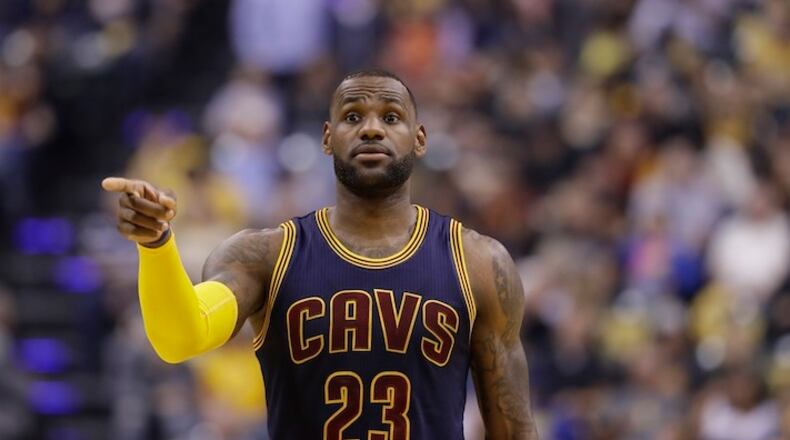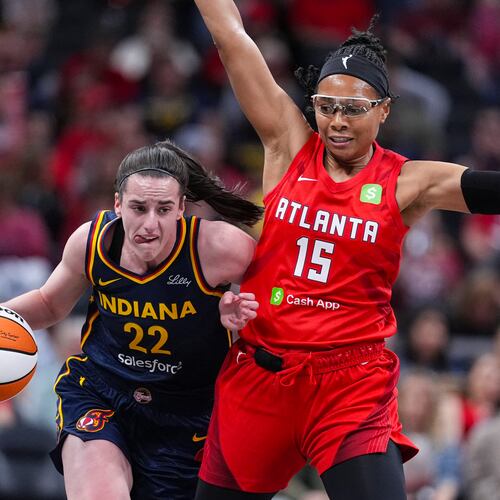J.R. Smith had no idea that he was a member of the last team that beat LeBron James in a first-round playoff game.
"I try not to remember too much of my New York days," Smith said of his troubled tenure with the Knicks.
James insisted he didn't remember his last first-round loss, either. It came on May 6, 2012, with the Miami Heat. As Carmelo Anthony poured in 41 points and Amar'e Stoudemire added 20 points and 10 rebounds, the Knicks pulled out a two-point victory in Game 4 despite James' 27 points, four rebounds and four assists.
But as James thought back, a few details surfaced from the recesses of his mind.
"J.R. had a nice move that game by the way. Windmill dunk on the baseline," James said. "We won that in five, right?"
Of course, he was right. That season the Heat went on to capture the first of two NBA titles with James, defeating the Oklahoma City Thunder in five games.
That seemingly meaningless Knicks game in May, 2012, became significant again Sunday as the best player in the world added to his otherworldly list of accomplishments.
With the Cavaliers' 106-102 victory over the Indiana Pacers in Bankers Life Fieldhouse that secured a sweep, James set the league record with his 21st consecutive first-round playoff triumph. The record dates back to 1984, when the league went to its current postseason format. James broke a tie with three Los Angeles Lakers from the mid-1980s — Magic Johnson, James Worthy and Michael Cooper.
The record isn't merely a statement about James' unrivaled skills and versatility. It reflects his ability to play through pain. His determination not to mentally take the night off against a lower-seeded opponent. His leadership to inspire the players around him. The general managers who constructed the rosters and the coaches who played a part — the Heat's Erik Spoelstra and the Cavs' David Blatt and Tyronn Lue.
Asked the logic behind James' record, Lue joked, "Great coaching."
"Spoelstra did a great job," Lue said. "It's just tough. Playoffs are tough. Series can go either way. For him being No. 1 or No. 2 seed playing a lower seed, that helps. But each night is something different. Just watching the teams playing now, there are some tough series. No matter what seed you are, teams have gotten better and there are going to be some tough games."
To prove that point, the Cavs' four victories by a total of 16 points against the Pacers tied the 1975 Golden State Warriors (vs. the Washington Bullets) for the smallest margin of victory in a four-game series.
James doesn't care about records, all he cares about is winning. But he'd obviously given some thought to this one and discussed what the 21st consecutive first-round victory signified to him.
"Competition is very hard. Mentally challenge yourself every year to go out and try to do what's right, put your body on the line, put your team on the line to try to be successful is very hard," he said. "I go out every night to try and win a ballgame. Do whatever it takes to help my teammates be successful and do whatever it takes to help me be successful. That's been the result of it.
"I'm truly blessed and honored to be in a position where I hold a record in this league that's had so many great players and so many great teams throughout the years in the postseason. I just want to continue to play the game the right way. If I do that, I give myself, my teammates and different guys and all the kids looking up to me for inspiration, it gives them hope. and that's all that matters to me."
James finished Sunday's game with 33 points, 10 rebounds and four assists. He scored all but three points in the paint, but that 3-pointer, a pull-up jumper with 1:08 remaining, gave the Cavs the lead for good. It was the only 3-pointer he made in three attempts.
In Game 3 vs. the Pacers, James willed the Cavs to the biggest second-half comeback in league history, bringing them back from a 25-point halftime deficit. His performance Sunday did not carry that magnitude.
But it included a highlight candidate for the post-career documentary, a chase-down block of Thaddeus Young with 6:06 left in the third quarter that saw James run down the tunnel behind the basket afterward. James said he wanted to atone for his turnover on the previous play when he had Kyrie Irving open for a layup, but Paul George got his hand on his pass.
"Sometimes I turn the ball over. And I hate turnovers. But the last thing I'm going to do after a turnover is let it happen," James said. "I've always got my little league coaches and my high school coaches in my head telling me if you turn the ball over, you'd better be one of the first ones to get back."
Asked how far he could have run, James said, "I was actually going to go for my little Forrest Gump thing and just keep it moving, but there was more basketball that needed to be played."
Smith's memory might be foggy about 2012, but he realizes the effect a James' chase-down block can have.
"That gives us a boost of motivation, especially when he blocks it and has that energy," Smith said.
James Jones, who has been to six consecutive NBA Finals with James, believes there is some calculation involved as well.
"Those are the type of plays that make him unique," Jones said. "To be able to harness that energy and go out there and make better plays, I'm pretty sure that goes through his mind when he does it. A lot of times he's coming from a disadvantage point, where he's maybe 10 steps behind, but only he can make those plays. When he does, I think our team recognizes there's another level we can get to."
No one knows whether the fast-twitch burst James displayed in blocking Young gave the Cavs the energy to stave off the Pacers and earn a week's rest before the second round. But it was an example of the mentality James summons when the playoffs begin, a mentality that made 21 consecutive first-round victories possible.
About the Author
Keep Reading
The Latest
Featured


